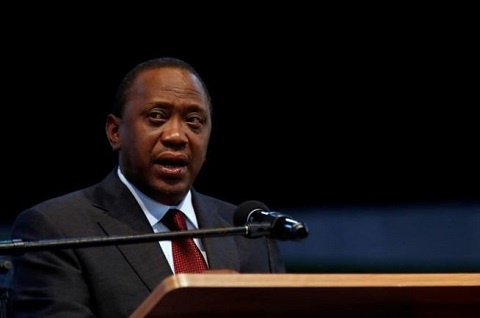 |
| President of Kenya, Uhuru Kenyatta |
NAIROBI, Jan 26 (NNN-AGENCIES) — Kenya’s President Uhuru Kenyatta said there should be urgency in resolving the Ethiopian conflict in Tigray to allow Addis Ababa and neighbours to concentrate on rebuilding their economies.
He said Kenya’s key infrastructure plans depend on Ethiopia’s peace. The head of state cited the telecom venture from Nairobi into Ethiopia as one key area that will depend on a stable Ethiopia to be rolled out.
In a dispatch from State House, he said the two countries have in the past been working on joint projects and warned that conflict could likely drag those targets.
“A strong Ethiopia is important to us. A stable Ethiopia is important to us. That is why we are committed to doing all we can to see the conflict resolved,” Kenyatta said after hosting visiting US Special Envoy for the Horn of Africa David Satterfield.
Satterfield, who reported on duty earlier than planned, has been touring the region to seek a solution to two crises in Sudan and Ethiopia.
For Kenya though, it is the Ethiopian conflict that is more critical. Kenyan telco Safaricom recently won a license to invest in Ethiopia but its rollout has been slowed down by the conflict.
Both countries are also part of the planned Lamu Port South Sudan Ethiopia Transport Corridor (Lapsset), a $2.1 trillion project of a seaport, highways, and pipelines when complete.
First launched in 2012, Kenya has completed the highway to Moyale on the common border with Ethiopia, built the first one-stop-border (OSBP), and built the first four berths of the planned 12 at the Lamu Port, which was estimated to cost Sh350 billion when complete.
Those projects though will depend on peace and stability in neighbouring countries to succeed. For example, Ethiopia is supposed to complete its part of the highway to Addis Ababa. But a security threat posed by rebel groups under the Oromo Liberation Army and the Tigray People’s Liberation Front (TPLF) means the projects cannot continue until the groups are pacified.
Since November, the TPLF has been fighting Ethiopian forces in a conflict that has rendered the north a war zone, displacing thousands.
Kenya says it will continue to push for a ceasefire, dialogue, and humanitarian access, but said there are no guarantees they can be achieved fast.
“We have dealt with this crisis in our way. We have endeavoured to support Ethiopia, we have provided counsel and we have engaged in our quiet soft diplomacy to push the process forward,” said Foreign Affairs CS Raychelle Omamo at a media briefing.
“We believe in Ethiopia’s ability to reach consensus. Sometimes consensus takes time. Sometimes things don’t move as quickly as you would want, but what you need to do as a neighbour is to remain committed.”
At State House, the US envoy agreed with Kenya to help push parties to a speedy resolution for the sake of the Horn of Africa’s stability.
The US is especially keen to see Nairobi use its good connections with both parties to influence a quick resolution.
“We believe that your role – in ending the Ethiopian conflict – was and remains extremely important. We appreciate the role Kenya has continued to play in the Horn of Africa region. We do look to your help and support in Ethiopia. We do not want the work you have done in that country to go to waste,” the visiting Special Envoy said, according to State House dispatch.
Satterfield has visited Sudan, Saudi Arabia, Ethiopia, and Kenya on his first trip to the Horn as Special Envoy. A former ambassador to Turkey, he replaced Jeffrey Feltman who left office early this month. Feltman had failed in his previous attempts to push for Ethiopia dialogue.
Addis Ababa has said it will not engage in dialogue with those it considers terrorists. However, both parties have recently indicated they could implement a ceasefire for the sake of humanitarian access. — NNN-AGENCIES
